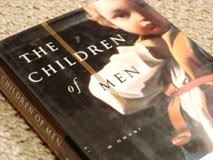 P.D. James’ The Children of Men is built around a single question: What would happen if women couldn’t conceive? That’s exactly what’s on the minds of everyone on earth in the year 2021, not least of Theodore Faron, historian and only surviving relative to the despotic Warden of England, Xan Lyppiatt. Sterility has held sway over the human race for 25 years, and outlying towns are falling into disrepair as the population shrinks. Bizarre cults and mass suicides are the order of the day. The youngest generation, dubbed Omegas, roams the countryside, delighting itself with vandalism and murder. Even the sleepy academic circles in which Theo moves are being shaken. One day he is approached by a woman named Julian who wants him to use his influence with the Warden to secure much-needed humanitarian reforms. But Theo learns there’s more to Julian than political ambitions -- she’s pregnant.
P.D. James’ The Children of Men is built around a single question: What would happen if women couldn’t conceive? That’s exactly what’s on the minds of everyone on earth in the year 2021, not least of Theodore Faron, historian and only surviving relative to the despotic Warden of England, Xan Lyppiatt. Sterility has held sway over the human race for 25 years, and outlying towns are falling into disrepair as the population shrinks. Bizarre cults and mass suicides are the order of the day. The youngest generation, dubbed Omegas, roams the countryside, delighting itself with vandalism and murder. Even the sleepy academic circles in which Theo moves are being shaken. One day he is approached by a woman named Julian who wants him to use his influence with the Warden to secure much-needed humanitarian reforms. But Theo learns there’s more to Julian than political ambitions -- she’s pregnant.The setup is wonderful, a great idea. Unfortunately, "built around" is an accurate way of describing the story that accompanies it. Children was James’ first and only detour into SF, and the inexperience shows. She alternates between exposition and action by erratically switching between first- and third-person perspectives. And "action" isn’t really an appropriate descriptor, since nothing much happens in the first half of the novel. Readers must content themselves with long passages about crumbling infrastructure, political maneuvering and new social trends (dolls and kittens become inadequate substitutes for babies). Liberal trimming would have helped the pace, but the characters are another matter. To wit, they’re a selfish and vapid bunch, quick with a sharp retort and slow to finish up mopey musings on religion and relationships, suicide and sex. (Indeed, I found it surprising that such subjects could be boring.) It’s not that they’re merely unlikable. They’re uninteresting, so that you’ve stopped caring by the time the novel finally snaps into genre mode near the end.
And yet, there are moments that make you want to forgive Children’s sins. There are meditative passages on the decline of science following the quiet disaster and the inverse relationship between pornography and lovemaking, poignant bits about laying down wine that will never be drunk and a cancer-stricken father whose tin-can-sliced index finger becomes symbolic of his terminal disease. You can see the great idea inside all the wordiness and meandering motivations and ceaseless talk of swilling claret before blowing one’s brains out. It’s a shame that Children didn’t have the strength to bring it forth.


No comments:
Post a Comment